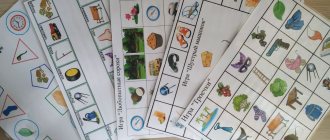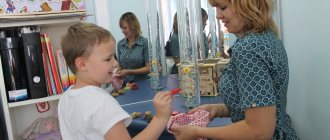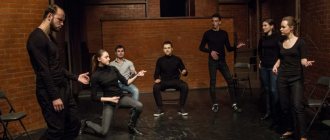The problem of “porridge in the mouth” is often found in young children. Many children, in a hurry to say something, pronounce only the initial syllables, swallow too complex endings, skip them, or shorten long words too much in their opinion. Today we will talk about why this happens, whether it is worth contacting a speech therapist and how you can get rid of this defect.
Immaturity of the central nervous system
The human brain is a very complex and multi-level structure. All babies are born with an immature nervous system, the processes of inhibition lag far behind the processes of excitation, and the central nervous system finally matures only by 5-6 years.
Have you ever noticed that it is very difficult to put an overexcited baby of absolutely any age to bed?
The babies rub their eyes, yawn, cry, even seem to fall asleep and start crying again. Older children scream and jump on the bed, may cry, throw hysterics, call their parents several times with minor requests, suddenly get scared and scream, but cannot sleep. The reason here is the same as for logoneurosis. This is the immaturity of the central nervous system.
Norms of speech development
When a child turns one year old, he begins to pronounce his first words. Girls speak earlier - at about 8 months, and boys - at 11-12 months. Between 1 and 2 years, a child's vocabulary expands rapidly. He remembers the names of surrounding objects. Starting at 2.5 years old, children begin to construct their first sentences. At first, the child does not care about their correctness. He simply puts familiar words next to each other. By the age of three, the baby gradually learns to coordinate them with each other.
From 2 to 5 years, a child’s speech develops most actively. At the very beginning, children simplify words, swallow complex endings, skip and change syllables. This is absolutely normal. For example, at two years old a baby may say “kapu” instead of “cabbage.” However, age-related tongue stiffness should disappear by age 5. If a child of 5-6 years old swallows parts of words, then you should pay special attention to him. Many parents don’t know what to do, so they start torturing their child with daily activities. You shouldn't do that. Due to heavy stress, the baby may become withdrawn and stop speaking. If a baby at 5-6 years old does not pronounce the endings when swallowing them, then it is recommended to consult a speech therapist.
The mechanism of triggering logoneurosis
Logoneurosis is a stuttering familiar to all of us. In world practice, not a single theory of the stuttering mechanism has yet been proven. Most scientists agree that overexcitation of Broca's center in the brain is to blame.
The period of active speech development is a time of enormous stress on the brain and central nervous system. Since in children the central nervous system is already in an insufficiently stable state, additional load can lead to systemic failures, one of which is logoneurosis.
Overexcitation from Broca's center spreads to the areas of the cerebral cortex responsible for movement, this, in turn, causes a spasm of the facial muscles, and the child stutters.
As soon as the overexcitation subsides, the cortex returns to a stable state and speech returns to normal. Logoneurosis comes in different types - one child repeats the ending of a word several times, another stutters on consonants, a third cannot start a phrase.
Where to start the correction?
First, you need to show the baby to a neurologist to rule out central nervous system pathology. In addition, the doctor can prescribe medications that improve blood supply to the brain and the activity of nerve cells, which will have a positive effect on speech development.
Secondly, you need to visit a speech therapist. He will listen to the baby’s speech and tell you exactly what caused the swallowing of syllables, whether it is necessary to contact a psychologist, and will select a correction program.
Thirdly, a lot depends on homework, because it is the parents who spend most of the time with the child. It is important to surround him with attention and care while speech correction is underway.
Babies at risk
Stuttering usually develops in preschool children. Most patients of speech therapists, psychologists and neurologists with a similar diagnosis are children 3-4 years old. It is at this age that most parents notice that the child repeats the ending of a word several times. Sometimes the baby stutters not at the end, but repeats the first or one of the middle syllables.
It should be noted that the occurrence of stuttering in adolescence and adulthood is practically not common. People with this disorder make up only 3% of the total number of cases. Of these, the vast majority received logoneurosis due to severe psychological trauma.
Logoneurosis can be corrected quite well, so at the first signs of the disease the child should be shown to a pediatrician. He, in turn, will prescribe a diagnosis from specialized specialists - a neurologist, psychologist and speech therapist - to determine the nature of the disorder and further treatment tactics.
How can you help your child?
Create a favorable environment for speech development and reward your child even for small achievements, so that the exercises bring him only positive emotions. We recommend including the following activities in your daily routine:
- finger games;
- articulation gymnastics;
- exercises for fine motor skills;
- dancing;
- games aimed at developing a sense of rhythm;
- playing musical instruments - drum, pipe, xylophone.
Here are a few games that will be useful for correcting the syllabic structure of words and will really appeal to your child.
Drummer
Show your baby a simple rhythmic pattern: clap your hands several times, observing a certain rhythm, and ask them to repeat.
Parrot
Ask your child to repeat after you first the vowels (AO-OA-AU-UA), open syllables (BA-BA-BA, BO-BO-BO, etc.), back syllables (AB-AB-AB, OB-OB -OB, etc.), syllables with consonant clusters (such as KVA-KVA-KVA), combinations of syllables. Choose only those sounds that are good for the child. If he completes the task without difficulty, then you can give simple words of two syllables such as uncle, melon, fox, kitty, Masha, etc.
Catch the ball
Throw the ball to the child and say the first syllable of a word he knows well, he must repeat it, throwing the toy back. Then you say the second syllable, throwing the ball again, the child repeats. Then you say the whole word. For example, KO-KO, ZA-ZA, GOAT-GOAT. This game can be complicated by including words of three open syllables, such as cubes, ducklings, head, raspberries, car, coin, milk, cow, road, Natasha, Marina, etc.
What was Natasha doing?
Instead of a doll named Natasha, you can take any toy. Pass it with your child to each other and list, one by one, what she did today. For example, she walked, ran, sat, flew, sculpted, cooked, bought, drove, bathed, wore, etc. Identical endings will help the baby not get confused and answer confidently.
What else can you do? Try to talk to your child at eye level. Learn simple poems and songs. Pronounce your words clearly, slowly and correctly. Encourage them to speak loudly and clearly, for example, to buy a bun or a treat in a store on their own (for this you need to contact the saleswoman).
Is the prognosis good? In most cases, yes, but it all depends on the cause that caused the speech disorder, how timely the correction was started, and how accurately the parents adhere to the recommendations of specialists.
Publication date: 12/19/2019. Last modified: 01/13/2020.
Classification of logoneuroses
The World Health Organization developed and adopted the 10th International Classification of Diseases - this is a generally accepted typology of medical diagnoses (hereinafter referred to as ICD-10). According to ICD-10, logoneurosis refers to emotional behavioral disorders that begin in childhood and adolescence, and has code F98.5.
According to clinical signs, logoneuroses are divided into two large groups - neurotic and neurosis-like. It is impossible to determine the type of disease on your own.
Neurotic logoneurosis
This type of disorder occurs as a result of a stressful situation that the child cannot cope with. The compensatory capabilities of the child's psyche are enormous, but not limitless. It is almost impossible to know what specific situation will unsettle your child. Some children are happy to go to fear rooms, ignore their parents’ comments and boldly step into the treatment room. Others don’t sleep at night after seeing Baba Yaga in a book, fight in hysterics at the dentist’s door and withdraw into themselves in response to a short remark from a parent.
We cannot isolate a child from external stress - aggressive classmates, a stern aunt-doctor or a zombie toy looking from a store window on Halloween Eve. But we can create a supportive and open environment at home. The baby should have a safe place where he can vent and cry out his sorrows and troubles. Do not scold your children for the slightest pranks and missteps - it is better to listen to the version of the offender and discuss what the child did wrong and how to avoid it in the future.
Another factor provoking the appearance of neurotic stuttering is early learning of foreign languages. Interestingly, children who initially grow up in a bilingual environment practically do not encounter this type of disorder. But for those who, at the age of active speech formation, are suddenly faced with the need to learn a second language, multiple repetitions of word endings are often observed. And the stress factor in this case plays an important role.
Neurosis-like stuttering
Unlike the first type of disorder, which occurs against the background of psychological trauma or stress and does not affect the actual structures of the brain, neurosis-like stuttering is only a symptom, while the source of the problem is in the damaged area of the cortex.
The cause of neurosis-like stuttering usually lies in a difficult pregnancy and birth injuries. During intrauterine hypoxia, the part of the brain responsible for speech is often damaged.
The problem becomes noticeable by the age of three, when the child begins to speak in sentences. Periods of stuttering are replaced by times of clear speech. The disease progresses in waves, with phases without stuttering becoming shorter and shorter and eventually disappearing completely.
Reasons for repeating word endings
Experts call a condition in which a child or adult repeats the endings of words logoneurosis. This systemic disorder is practically unrelated to the speech apparatus, as it might seem at first glance.
The main cause of the pathology lies in the dysfunction of the nervous system. Children with logoneurosis in normal situations pronounce all sounds perfectly, but when stress occurs, they stop doing this in a normal way.
Why does word endings repeat?
- existing mental illnesses, for example, neurasthenia or schizophrenia;
- previous brain injuries;
- hereditary predisposition;
- character traits. Most often, nervous, suspicious, and anxiety-prone people repeat the endings of words;
- diseases, including infectious ones, affecting the brain - strokes, tumors, meningitis and others;
- other existing developmental disorders of the speech apparatus: alalia, dyslalia and others;
- suffered psychological trauma or severe stress;
- fear of speech. This usually occurs in children who have experienced an unsuccessful public performance;
- nervous and physical fatigue. Most often it occurs in those children who, in parallel with their studies at school, receive additional education (sports and creative sections);
- unfavorable psychological situation in the family or in an educational institution. In the first case, the provocateur of logoneurosis is most often scandals between parents, too strict upbringing, and excessive demands on the child. In the second - conflicts with peers.
In rare cases, speech problems are caused by the excessive zeal of parents, who literally train their child from the age of one using different methods, wanting him to master several foreign languages at once or start learning poetry.
The diagnosis of logoneurosis is made when symptoms manifest significantly, and stuttering is almost always accompanied by tension, fear and anxiety before speaking.
Diagnostics
So, the parents noticed that the child repeated the ending of the word several times. Which doctor should I contact? If the problem is only in endings, and the baby has not reached the age of two years, perhaps he does not suffer from logoneurosis, but is just practicing the pronunciation of individual sounds and words. The problem of pathological stuttering can easily be noticed by a mother or any other adult caring for a child. When stuttering, you may notice a spasm of the facial muscles, which prevents the child from finishing a word or phrase.
If any speech problems arise, the child should definitely be shown to a specialist - the sooner treatment is started, the greater the likelihood that he will completely get rid of the problem.
Diagnosis will require examination by a number of specialists - a pediatrician, neurologist, psychologist and speech therapist. It may be necessary to conduct an EEG if the disease is acute and there is a suspicion of neurosis-like stuttering.
Corrective work
What to do if a child swallows the endings of words? At 3-4 years old you don’t have to worry. If the child has not corrected his speech by the age of 5, then it is worth contacting specialists. First of all, you need to visit a neurologist. He will help identify the cause, tell you what to do and what medications you need to take. MRI and EEG may also be prescribed. If a child swallows the endings of words due to any disease, then it must be eliminated.
After a neurologist, the child needs to see a speech therapist. If necessary, he will advise you to consult with a psychologist, assess the child’s speech condition, prescribe group or individual classes, and also tell him in detail what parents should do. Family activities are an important part of correcting speech disorders. Therefore, parents should pay special attention to their child.
Therapy
Logoneurosis requires labor-intensive, long-term treatment from a number of specialists (taking sedatives, almost daily sessions with a speech therapist, therapy with a child psychologist or neuropsychiatrist).
Today, there are many different methods for treating logoneurosis in children, each of which, individually or in combination with other types of therapy, gives a lasting and visible result.
After all, the fact that a child repeats the ending of a word several times is just the tip of the iceberg. The root cause lies much deeper - in a traumatic memory, constantly suppressed difficult emotions or organic damage to a part of the brain. Both the first and second, and especially the third, require the work and supervision of a specialized specialist.
How to alleviate the child's condition?
Many parents complain that the treatment is carried out in full, but there is no relief. The child both stuttered and stutters. Parents lose patience, get angry, and suspect the child of deception. The child, in turn, becomes nervous, logoneurosis worsens, and instead of effective therapy, the result is walking in a vicious circle.
Parents of a child with logoneurosis should remember that even the most modern treatment methods and medications will not help if a traumatic environment persists at home. Therefore, experts recommend organizing a security regime that includes several measures:
- Confidential and calm environment. The more confident the baby feels, the clearer his speech.
- Clear daily routine. Going to bed in a timely manner will help avoid overwork and relieve stress on the central nervous system.
- Restriction or complete ban on the use of gadgets and viewing media programs. In a child with logoneurosis, excitation of the central nervous system already predominates over inhibition; the brain and nervous system must not be overloaded with additional stimuli.
- Emphasis on fine motor skills and solo play.
The vast majority of children do not stutter when they play with themselves; this strengthens their self-confidence and relieves possible nervousness when communicating with peers. Fine motor skills are inextricably linked with speech development. Both points are very important in the treatment of logoneurosis.
In the article we found out in detail what logoneurosis in children is. This is a stuttering of one developmental nature or another, which must be treated strictly under the supervision of a specialist. With timely initiation of treatment, the prognosis is favorable.
Forecast
If the baby does not pronounce parts of words and endings, then in most cases the prognosis is favorable. However, it is difficult to say anything for sure. The prognosis depends on the cause of the speech pathology. One thing is certain - timely measures to diagnose and correct violations are important.
It is important to remember that the child must be surrounded by attention and care during speech correction. This will allow him not only to speed up the process of normalizing speech, but also to get rid of psychological complexes.











